Error processing SSI file
Caring for Someone Sick at Home
2009 H1N1 flu and seasonal flu
FACT SHEET
Caring for Someone Sick at Home

About 2009 H1N1 flu
Many people may become sick with 2009 H1N1 flu
This flu season, many people may get sick with 2009 H1N1 flu, as well as with seasonal flu.
- The first cases of 2009 H1N1 flu were reported in the spring of 2009. Since the virus is new, most people are not immune to it. That means many more people may become sick than usual this flu season.
- The word “flu” is short for “influenza.” They mean the same thing.
5 steps to take if you get 2009 H1N1 or seasonal flu
- Stay at home and rest.
- Avoid close contact with well people in your house so you won’t make them sick.
- Drink plenty of water and other clear liquids
to prevent fluid loss (dehydration).
- Treat fever and cough with medicines you can
buy at the store.
- If you get very sick or are pregnant or have
a medical condition that puts you at higher risk of flu complications (like asthma...), call your doctor. You might need antiviral medicine to treat flu.

Caring for Someone Sick at Home
Flu germs are spread from person to person
The flu is thought to spread mostly from person to person through coughs and sneezes of people who are sick with the flu.
Flu viruses may also survive for a few hours on surfaces such as doorknobs, phones, and cups. You may also get the flu if you touch
these surfaces and then touch your eyes, mouth, or nose before washing your hands.
How to keep yourself and others healthy during flu season
- Talk to your doctor about whether you need both seasonal and H1N1 flu vaccines.
- Cover your nose and mouth with a tissue when you cough or sneeze. Throw the tissue in the trash after you use it.
- Wash your hands often with soap and water, especially after you cough or sneeze. If soap and water are not available, use an alcohol-based hand rub.
- Stay away from sick people as much as possible.

Caring for Someone Sick at Home
2009 H1N1 flu may be more serious for some
Most people have been able to recover at home from 2009 H1N1 and seasonal flu without needing medical care. However, the flu can be more serious for some people.
People at High Risk for Developing Flu-Related Complications
- Children younger than 5, but especially children younger than 2 years old
- Adults 65 years of age and older
- Pregnant women
- People who have medical conditions including:
- Asthma
- Neurological and neurodevelopmental conditions [including disorders of the brain, spinal cord, peripheral nerve, and muscle such as cerebral palsy, epilepsy (seizure disorders), stroke, intellectual disability (mental retardation), moderate to severe developmental delay, muscular dystrophy, or spinal cord injury].
- Chronic lung disease (such as chronic obstructive pulmonary disease [COPD] and cystic fibrosis)
- Heart disease (such as congenital heart disease, congestive heart failure and coronary artery disease)
- Blood disorders (such as sickle cell disease)
- Endocrine disorders (such as diabetes mellitus)
- Kidney disorders
- Liver disorders
- Metabolic disorders (such as inherited metabolic disorders and mitochondrial disorders)
- Weakened immune system due to disease or medication (such as people with HIV or AIDs, or cancer, or those on chronic steroids)
- People younger than 19 years of age who are receiving long-term aspirin therapy
If you have flu symptoms and are also in one of the above groups, call the doctor. Your doctor may prescribe medicines that can make your illness milder and make you feel better faster. They may also prevent serious flu complications.
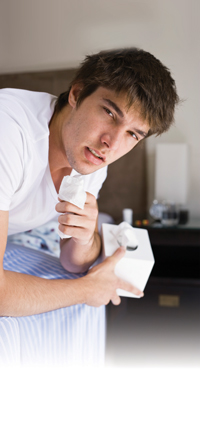
Caring for Someone Sick at Home
Flu symptoms
People who have the flu often feel some or all of these symptoms:
- A fever or feeling feverish/chills
- Cough
- Sore throat
- Runny or stuffy nose
- Muscle or body aches
- Headaches
- Fatigue (feeling very tired)
Some people may also:
- Throw up
- Have loose stools (diarrhea)
How long should people with the flu stay at home?
People with flu-like illness should stay at home except to get medical care or other necessities:
- Until at least 24 hours after they are free of a fever without having taken any medicines that lower fever. Examples of medicines that lower fever include acetaminophen (such as Tylenol®) and ibuprofen (such as Advil® or Motrin®).
When you see a ® mark after a product it is only meant as an example of a brand-name drug. It doesn’t mean the U.S. government or CDC is endorsing or recommending that certain product.

Caring for Someone Sick at Home
Know the emergency warning signs
There are “emergency warning signs” that should signal anyone to seek medical care urgently.
Seek care if the sick person has ANY of the signs below.
In adults, emergency warning signs that need urgent medical attention include:
- Difficulty breathing or shortness of breath
- Pain or pressure in the chest or abdomen
- Sudden dizziness
- Confusion
- Severe or persistent vomiting (vomiting that goes on)
In children, emergency warning signs that need urgent medical attention include:
- Fast breathing or working hard to breathe
- Bluish skin color
- Not drinking enough fluids
- Not waking up or not interacting
- Being so irritable that the child does not want to be held
- Flu-like symptoms that improve but then return with fever and worse cough
- Fever with a rash
- Being unable to eat
- Having no tears when crying
In addition to the signs above, get medical help right away for any infant who has any of these signs:
- Being unable to eat
- Has trouble breathing
- Having no tears when crying

Caring for Someone Sick at Home
Make a separate sick room, if you can
Keeping the person with flu in a separate sick room can help keep others in the family from getting the flu.
Take these steps to create a separate sick room:
- Try to give the sick person their own room. If there is more than one sick person, they can share the sick room if needed.
- If you have more than one bathroom, have sick people use one bathroom and well people use the other one.
- Give each sick person their own drinking glass, washcloth, and towel.
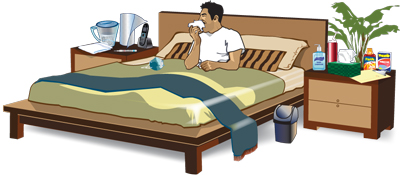
Have these items in the sick room
- Tissues
- Trash can with lid and lined with a plastic trash bag
- Alcohol-based hand rub
- Cooler or pitcher with ice and drinks
- Cup with straw or squeeze bottle to help with drinking
- Thermometer
- Humidifier (A machine that puts tiny drops of water into the air. This extra moisture can make it easier for the sick person to breathe.)
- Facemasks (Sick people should wear a facemask if available when they leave the sick room or are around other people.)
About medicines in the sick room
- Store all medicines out of reach of children. If you have no young children in the home, place medicines for adults in the sick room.
- Write down medicine dose and when doses are needed.

Caring for Someone Sick at Home
Follow the sick room rules
Protect well family members from getting the flu. If the sick person must leave the room to go to the bathroom or to a doctor’s visit, ask them to wear a facemask. No facemask at home? Ask the sick person to use a tissue to cover coughs and sneezes.
Follow these 4 sick room rules:
1. Avoid having other people enter the sick room.
The sick person should not have visitors other than the caregiver. If visitors must enter, they should stay at least 6 feet away from
the sick person.
2. Cover coughs and sneezes.
Ask the sick person to cover their nose and mouth with a tissue when they cough and sneeze. Ask them to throw used tissues in the trash.
3. Choose one caregiver.
If you can, choose only one caregiver to take care of sick family members. If possible, ask someone else to be the caregiver if you are pregnant or have certain chronic health problems. If you get the flu, it could be much more serious for you.
4. Keep the air clean.
Open a window in the sick room, if possible, or use a fan to keep fresh air flowing.

Caring for Someone Sick at Home
How to clean the sick room
You’ll want to clean the sick room each day. Follow these tips:
Cleaning hard surfaces
- Clean surfaces that may have flu germs on them. These may include doorknobs, bedside tables, bathroom sinks, toilets, counters, phones, and toys.
- Clean these hard surfaces by using water and dish soap. Or use common household cleaners that kill germs.
Cleaning bed linens and laundry
- Wash bed sheets and towels with normal laundry soap and tumble dry on a hot dryer setting. Hold all dirty laundry away from your face and body. Wash your hands right after touching dirty laundry.
- It’s OK to wash the sick person’s bedding or clothes with other people’s laundry.
Cleaning dishes
- Wash the sick person’s dishes with normal dish soap or place in the dishwasher.
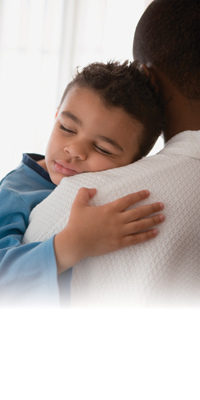
Caring for Someone Sick at Home
Tips for caregivers
When caring for people who have the flu:
- Avoid being face to face with the sick person. If possible, it is best to spend the least amount of time in close contact
with a sick person.
- When holding sick children, place their chin on your shoulder so they will not cough in your face.
- Wash your hands often and the right way. Sing the “Happy Birthday” song two times or count slowly to 20
as you wash.
- If soap and water are not available, use an alcohol-based hand rub.
- Make sure to wash your hands after touching the sick person. Wash after handling their tissues or laundry.
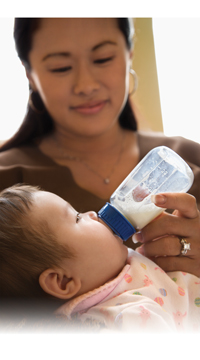
Caring for Someone Sick at Home
Tips to prevent fluid loss (dehydration)
Give plenty of liquids at the first sign of flu. Sick people with the flu need to drink extra fluids to keep from getting dehydrated. Mild fluid loss can most often be treated at home. Yet, severe dehydration is VERY serious and must be treated in the hospital.
Tips to prevent dehydration
- If the sick person is not eating well, encourage them to drink liquids. Avoid alcohol or drinks with caffeine in them such as colas, tea, and coffee.
- Older adults and people with kidney problems should check with their doctor about safe amounts of liquid to drink when sick.
- Offer clear fluids such as water, broth, or sports drinks.
- Use a squeeze bottle or a straw for people too weak to drink from a cup. Or offer ice chips or frozen ice pops to suck on.
- Continue to nurse or bottle feed your baby. Babies get all the fluid they need from breastfeeding or formula.
If your baby refuses to breastfeed or take formula from the bottle, call the doctor. Your doctor may recommend you give your child a special drink like Pedialyte®, which is meant to prevent dehydration.
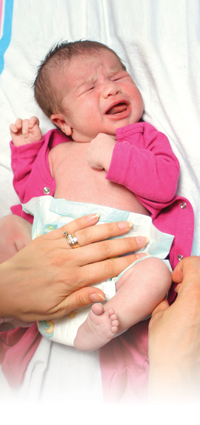
Caring for Someone Sick at Home
Check for fluid loss
Use this list to check for dehydration:
- Make sure babies have wet diapers.
Check that wet diapers are as frequent and heavy as normal.
- Look for tears when the baby or toddler is crying.
- Check to see how wet the child’s mouth is. The inside of the mouth should be wet. Wash your hands after you do this.
- Check to see that children, teens, and adults are making frequent trips to the bathroom to urinate.
- Check the urine color. Clear or light yellow-colored urine means the person is getting enough fluid. Dark yellow urine signals the person is dehydrated.
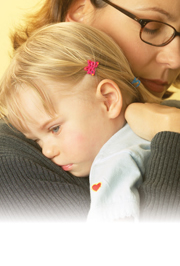
Caring for Someone Sick at Home
When to get medical help for fluid loss
While anyone can become dehydrated, infants, children, and older adults are at greatest risk of getting dehydrated. Also, pregnant women will want to make sure they are getting enough fluids.
When to call the doctor to ask for advice
Call right away if you or your child has any of these symptoms of dehydration:
Signs of dehydration in infants and toddlers:
Sunken soft spot on top of your infant’s head
- Diarrhea or vomiting in infants 2 months or younger
- They baby seems much less active or more irritable than normal
- Fewer tears when crying or not making tears
Signs of dehydration in children and adults:
- Not making tears
- Less than normal amount of urine. In babies you may see fewer wet diapers or diapers that weigh less than normal
- Skin that is dry and takes long to go back to position when pinched
- Dry mouth or dry eyes
- Fast-beating heart
- Blood in the stool or blood in vomit
- The child has had a fever for 12 or more hours and also is not able to drink fluids, throwing up or having diarrhea
- The child may be cranky or irritable, hard to wakeup, have little energy, appear “rag doll weak”
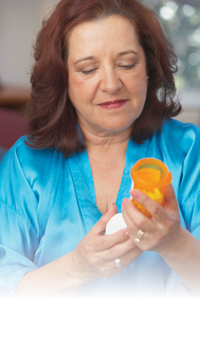
Caring for Someone Sick at Home
Medicine safety
Take the right amount of medicine
Read labels to make sure you are taking the dose listed on the label.
Call your doctor or pharmacist if you have questions. Watch that you don’t go over the daily limit (maximum dose) for certain medicines. Never give aspirin to children age 18 or under if they have the flu.
Don’t drink alcohol and take medicine
Some medicine labels say, “Do not mix with alcohol” or “Avoid using with alcohol.” Many prescription and over-the-counter medicines can be dangerous or deadly when mixed with beer, wine, or liquor of any kind.
Talk to your doctor if you are pregnant
If you are pregnant or think you might be pregnant, make sure you talk
to your doctor before taking any medicines.

Caring for Someone Sick at Home
Medicine safety and children
About medicines for children
- Store all medicines out of reach of children. Place them in a locked cabinet where children can’t reach them.
- Buy pain and fever medicines that say “children’s” on the label. Also, look for the words “acetaminophen” or “ibuprofen” on the label.
- Call the doctor if your child is very small or very large for his or her age so you will be sure to give the right amount of medicine. The dose you give your child depends on the child’s age and weight.
- Use a special medicine spoon, dropper, or the cap that came with the medicine. Wash the cap, dropper, or spoon with soap and water after each use.
- Don’t give cough or cold medicines to children younger than 4 years of age.
Warning
Think your child age 18 or younger might have the flu?
Never give them aspirin or products with aspirin in them.
Check all medicine labels to make sure they do not contain aspirin, also called salicylate. Although it mostly affects people age 18 or younger, Reye’s Syndrome can strike anyone who takes aspirin products when they have the flu.
Reye’s Syndrome is a rare, serious illness than can affect the blood, liver, and brain of someone who has recently had a flu virus. This illness can cause confusion, seizures, or coma. Talk to your child’s doctor about signs and symptoms of Reye’s Syndrome.

Caring for Someone Sick at Home
Treat fever
About fever
Bringing down a fever will make the person feel better and help patients rest.
Treating a fever without medicine
- Put a cool, damp washcloth on their forehead.
- Wash their arms and body with a cool cloth.
- Give the person a slightly warm bath.
Treating a high fever with medicine
- Look for the ingredients “acetaminophen” or “ibuprofen” on labels.
- These medicines may take 30 to 45 minutes to start working. They may not bring fevers down to normal temperature.
When a fever causes a seizure
A seizure makes you have jerky spasms and can also make you pass out. In rare cases, a fever can bring on a seizure, called a “febrile seizure.” Seizures brought on by fever are more common in young children. Call the doctor or get medical help for seizures.
Any child younger than 3 months who has a fever should see a doctor.
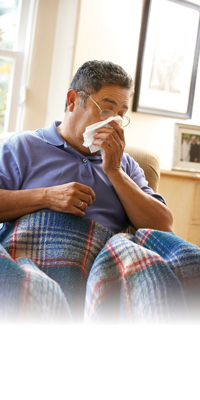
Caring for Someone Sick at Home
Treat dry cough
About coughs
Coughing can help clear out mucous and congestion from your lungs. Yet, dry coughs when there is no mucous can make your airways, throat, or chest sore. Treating a dry cough can stop this sore feeling and also help you get rest.
Treating a dry cough
- Ask the pharmacist about which cough medicines are best to treat a dry cough. Do not give children younger than 4 years of age cough or cold medicines.
- Set up a humidifier. That’s a machine that puts tiny drops of water (moisture) into the air. This extra moisture can make it easier for the sick person to breathe.
- Offer adults a cough drop or hard candy to soothe their throat and lessen the urge to cough.
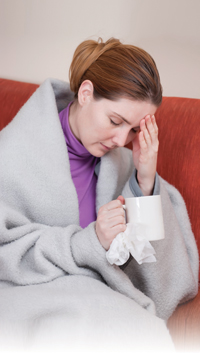
Caring for Someone Sick at Home
Treat other flu symptoms
Treating sore throat
Offer the person:
- Acetaminophen or ibuprofen for the pain
- Ice chips or frozen ice pops to numb the throat and get fluids into the body
Some people find gargling with salt water helps soothe a sore throat.
- Mix 1 cup of warm water with 1 teaspoon of salt.
- Gargle and then spit out.
Treating chills, aches, and pain
Offer the person:
- A light blanket for chills
- Acetaminophen or ibuprofen for aches and pain. Make sure to read the label for the right amount.
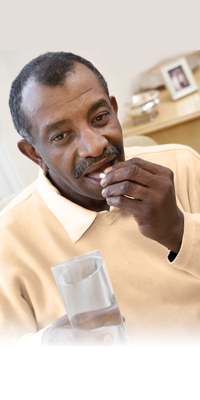
Caring for Someone Sick at Home
Treat other flu symptoms
Treating congestion
The flu can cause the body to make more mucous. The nose, sinuses, ears, and chest can get stuffy. This congestion can cause pain.
Offer the person:
- Acetaminophen or ibuprofen for the pain
- Decongestants (Talk to your pharmacist about the kind you should buy. Do not give cough or cold medicine to children younger than 4 years of age.)
- A humidifier. That’s a machine that puts tiny drops of water (moisture) into the air. This extra moisture can make it easier
for the sick person to breathe.
- A warm washcloth on the face to ease sinus pain
Treating stomach problems
People with the flu may have stomach pain. They may even throw up or have loose stools (diarrhea). Anyone with severe stomach pain should call the doctor.
Offer the person:
- Plain foods that are easy on the stomach
- Clear liquids to drink
- Medicines to help adults treat loose stools



















